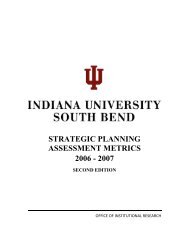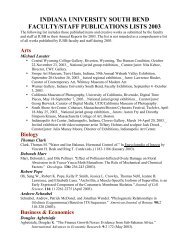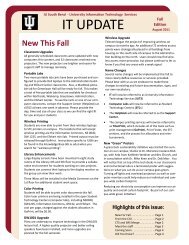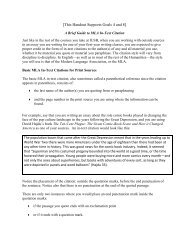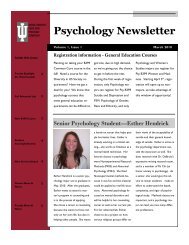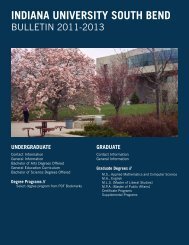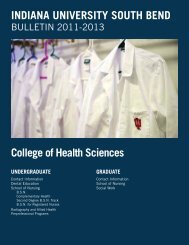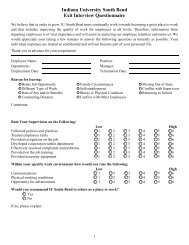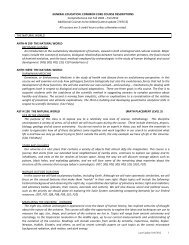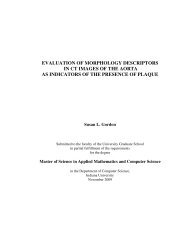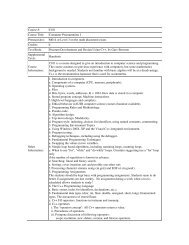Current version - Indiana University South Bend
Current version - Indiana University South Bend
Current version - Indiana University South Bend
You also want an ePaper? Increase the reach of your titles
YUMPU automatically turns print PDFs into web optimized ePapers that Google loves.
3563 IU SOUTH BEND COURSE DESCRIPTIONS<br />
MATH-M 448<br />
MATH-M 451<br />
Mathematical Models and<br />
Applications 2 (3 cr.)<br />
P: MATH-M 447. Formation and study of<br />
mathematical models used in the biological,<br />
social, and management sciences.<br />
Mathematical topics include games,<br />
graphs, Markov and Poisson processes,<br />
mathematical programming, queues, and<br />
equations of growth. Suitable for secondary<br />
school teachers. II (odd years)<br />
the Mathematics of finance (3 cr.)<br />
P: Two courses from the following<br />
MATH-M 301, MATH-M 311, MATH-M<br />
343, MATH-M 365, MATH-M 447,<br />
MATH-M 463. Interest theory;<br />
introduction to theory of options pricing;<br />
Black-Scholes theory of options; general<br />
topics in finance as the time value of<br />
money, rate of return of an investment,<br />
cash-flow sequence, utility functions<br />
and expected utility maximization, mean<br />
variance analysis, optimal portfolio<br />
selection, and the capital assets pricing<br />
model; topics in measurement of interest.<br />
I (even years)<br />
MATH-M 463 INTRODUCTION TO PROBABILITY THEORY 1<br />
(3-4 cr.)<br />
C: MATH-M 311. The meaning of probability.<br />
Random experiment, probability models,<br />
combinatoric techniques, conditional<br />
probability, independence. Random<br />
variables, distributions, densities,<br />
expectation, moments, transformation of<br />
random variables. Important discrete and<br />
continuous distributions. Multivariate<br />
distributions, correlations. Moment<br />
generating functions, laws of large<br />
numbers, central limit theorem, normal<br />
approximation. I<br />
MATH-M 466<br />
INTRODUCTION TO MATHEMATICAL<br />
STATISTICS (3 cr.)<br />
P: MATH-M 463. Theory of sampling<br />
distribution, Chebyshev’s inequality,<br />
convergence in probability. Estimation<br />
theory, maximum likelihood estimators,<br />
method of moments, goodness of<br />
point estimators, confidence intervals.<br />
Hypothesis testing, power function,<br />
error types, likelihood ratio tests. Nonparametric<br />
methods. Regression. Analysis<br />
of variance. Sufficient statistics. Bayesian<br />
estimation, asymptotic distribution of<br />
maximum likelihood estimators. II<br />
MATH-M 467 advanced statistical techniques 1<br />
(3 cr.)<br />
P: MATH-M 466 or consent of<br />
instructor. Statistical techniques of<br />
wide application, developed from the<br />
least-squares approach: fitting of lines<br />
and curves to data, multiple regression,<br />
analysis of variance of one- and two-way<br />
layouts under various models, multiple<br />
comparison.<br />
MATH-M 468 advanced statistical techniques 2<br />
(3 cr.)<br />
P: MATH-M 466 or consent of instructor.<br />
Analysis of discrete data, chi-square tests<br />
of goodness of fit and contingency tables,<br />
Behrens-Fisher problem, comparison of<br />
variances, nonparametric methods, and<br />
some of the following topics: introduction<br />
to multivariate analysis, discriminant<br />
analysis, principal components.<br />
MATH-M 471<br />
MATH-M 472<br />
MATH-M 491<br />
MATH-M 546<br />
Numerical Analysis 1 (3 cr.)<br />
P: MATH-M 301, MATH-M 311, CSCI-C<br />
101, or consent of instructor. R: MATH-M<br />
343. Numerical solutions of nonlinear<br />
equations; interpolation, including finite<br />
difference and splines; approximation,<br />
using various Hilbert spaces; numerical<br />
differentiation and integration; direct<br />
methods for linear systems; iterative<br />
techniques in matrix algebra. Knowledge<br />
of a programming language such as C,<br />
C++, or Fortran is a prerequisite of this<br />
course. I (odd years)<br />
Numerical Analysis 2 (3 cr.)<br />
P: MATH-M 471 and MATH-M 343.<br />
Numerical solutions of nonlinear<br />
systems; solution of ordinary differential<br />
equations: initial-value problems,<br />
boundary-value problems; computation<br />
of eigenvalues and eigenvectors;<br />
introduction of numerical solutions for<br />
partial differential equations.<br />
PUTNAM EXAMINATION SEMINAR (1 cr.)<br />
P: MATH-M 211 or MATH-M 215, or<br />
consent of instructor or department<br />
chair. The Putnam Examination is a<br />
national mathematics competition for<br />
college undergraduates at all levels of<br />
study. It is held in December each year.<br />
This problem seminar is designed to help<br />
students prepare for the examination.<br />
May be repeated twice for credit. I<br />
Control theory (3 cr.)<br />
P: MATH-M 301, MATH-M 343. This<br />
course is an introduction to the analysis<br />
of feedback control systems. Topics may<br />
include: modeling of physical, biological,<br />
and information systems using linear<br />
and nonlinear differential equations;<br />
state=space description of systems;<br />
frequency and time domains; linear<br />
dynamic control systems; stability and<br />
P = Prerequisite, R = Recommended, C = Concomitant, VT = Variable Title<br />
I = fall semester, II = spring semester, S = summer session(s)



